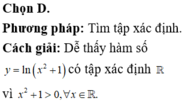Trong các hàm số được cho dưới đây, hàm số nào có tập xác định D=R
A. y = ln x 2 - 1
B. y = ln 1 - x 2
C. y = ln x + 1 2
D. y = ln x 2 + 1
Hãy nhập câu hỏi của bạn vào đây, nếu là tài khoản VIP, bạn sẽ được ưu tiên trả lời.



\(a,4^x-2^{x+1}\ge0\\ \Leftrightarrow2^{x+1}\le2^{2x}\\ \Leftrightarrow x+1\le2x\\ \Leftrightarrow x\ge1\)
Tập xác định của hàm số là D = \([1;+\infty)\)
\(b,\left\{{}\begin{matrix}x>0\\1-ln\left(x\right)>0\end{matrix}\right.\\ \Leftrightarrow\left\{{}\begin{matrix}x>0\\ln\left(x\right)< 1\end{matrix}\right.\\ \Leftrightarrow0< x< e\)
Tập xác định của hàm số là \(\left(0;e\right)\)

Chọn D. Bởi vì hàm số ln x luôn luôn dương nên chắc chắn sẽ đồng biến trên TXĐ của nó

a, Điều kiện: \(2^x\ne3\Rightarrow x\ne log_23\)
Vậy D = R \ \(log_23\)
b, Điều kiện: \(25-5^x\ge0\Rightarrow5^x\le5^2\Rightarrow x\le2\)
Vậy D = \((-\infty;2]\)
c, Điều kiện: \(\left\{{}\begin{matrix}x>0\\lnx\ne1\end{matrix}\right.\Rightarrow\left\{{}\begin{matrix}x>0\\x\ne e\end{matrix}\right.\)
Vậy D = \(\left(0;+\infty\right)\backslash\left\{e\right\}\)
d, Điều kiện: \(\left\{{}\begin{matrix}x>0\\1-log_3x\ge0\end{matrix}\right.\Rightarrow\left\{{}\begin{matrix}x>0\\log_3x\le1\end{matrix}\right.\Rightarrow\left\{{}\begin{matrix}x>0\\x\le3\end{matrix}\right.\Rightarrow0< x\le3\)
Vậy D = \((0;3]\)